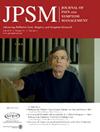ICU成年癌症患者子女孝道、经济毒性与替代决策冲突的关系。
IF 3.5
2区 医学
Q2 CLINICAL NEUROLOGY
引用次数: 0
摘要
背景:孝道是儒家的一种文化价值观,在中国和许多其他亚洲文化中深深植根于亲子关系。成年子女在为病重的父母做决定时经常会遇到决策冲突。然而,孝道与替代决策冲突之间的定量关系尚未被探讨。目的:探讨癌症重症监护病房(ICU)成年子女的经济毒性和孝道与替代决策冲突的关系。方法:对广州市某三级医院ICU进行横断面调查。180名成年儿童作为癌症患者的代理人,在患者住进ICU至少4天后完成了调查。测量包括家庭版的决策冲突量表、晚期癌症患者子女孝道价值观量表和财务毒性综合评分。采用多元回归分析,探讨代理决策冲突的相关因素。结果:ICU癌症患者的成年子女存在较高的替代决策冲突。代决策冲突与兄弟姐妹较多(β=0.183,p=0.017)、孝顺程度较低(β=-0.177,p=0.018)和严重的经济毒性(β=-0.159,p=0.045)相关。结论:建议医疗服务提供者在中国成年子女为其在ICU的癌症父母做决定时提供文化敏感的支持,例如提供减轻财务毒性负面影响的策略,帮助代孕母亲阐明孝道价值观以缓解决策冲突。本文章由计算机程序翻译,如有差异,请以英文原文为准。
The Association of Filial Piety and Financial Toxicity With Surrogate Decisional Conflict Among Adult Children of ICU Patients With Cancer
Context
Filial piety, a Confucian cultural value, is deeply rooted in the parent-child relationship in Chinese and many other Asian cultures. Adult children often experience decisional conflict when making decisions for their critically ill parents. However, the quantitative relationship between filial piety and surrogate decisional conflict has yet to be explored.
Objective
To examine the associations of both financial toxicity and filial piety with surrogate decisional conflict among adult children of intensive care unit (ICU) patients with cancer.
Methods
A cross-sectional survey was conducted in an ICU of a tertiary hospital in Guangzhou, China. A sample of 180 adult children serving as surrogates for patients with cancer completed the survey after the patients had been admitted to the ICU for at least 4 days. The measures included the family version of the Decision Conflict Scale, the Filial Piety Values Scale for Children of Patients with Advanced Cancer, and the Comprehensive Scores for Financial Toxicity. Multiple regression analysis was conducted to examine factors associated with surrogate decisional conflict.
Results
The adult children of ICU patients with cancer experienced a high level of surrogate decisional conflict. Surrogate decisional conflict was associated with more siblings (), lower levels of filial piety () and severe financial toxicity ().
Conclusion
Healthcare providers are recommended to provide culturally sensitive support for Chinese adult children making decisions for their parents with cancer in the ICU, such as offering strategies to mitigate the negative impact of financial toxicity and helping surrogates clarify their filial piety values to relieve decisional conflict.
求助全文
通过发布文献求助,成功后即可免费获取论文全文。
去求助
来源期刊
CiteScore
8.90
自引率
6.40%
发文量
821
审稿时长
26 days
期刊介绍:
The Journal of Pain and Symptom Management is an internationally respected, peer-reviewed journal and serves an interdisciplinary audience of professionals by providing a forum for the publication of the latest clinical research and best practices related to the relief of illness burden among patients afflicted with serious or life-threatening illness.

 求助内容:
求助内容: 应助结果提醒方式:
应助结果提醒方式:


